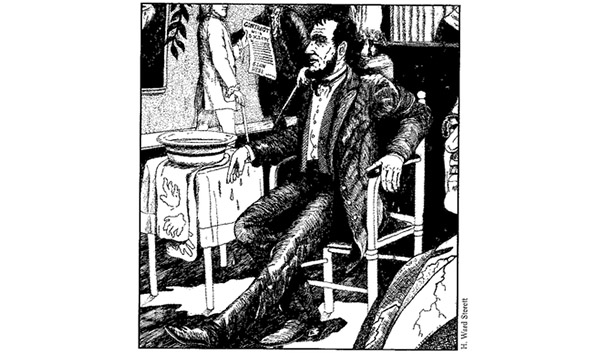Abraham Lincoln is thought of by many as not only the greatest American statesman but as a great conservative. He was neither. Understanding this is a necessary condition for any genuinely American conservatism. When Lincoln took office, the American polity was regarded as a compact between sovereign states which had created a central government as their agent, hedging it in by a doctrine of enumerated powers. Since the compact between the states was voluntary, secession was considered an option by public leaders in every section of the Union during Hie antebellum period. Given this tradition—deeply rooted in the Declaration of Independence—a great statesman in 1860 would have negotiated a settlement with the disaffected states, even if it meant the withdrawal of some from the Union. But Lincoln refused even to accept Confederate commissioners, much less negotiate with them. Most of the Union could have been kept together. Virginia, North Carolina, Tennessee, and Arkansas voted to remain in the Union even after the Confederacy was formed; they reversed themselves only when Lincoln decided on a war of coercion. A great statesman does not seduce his people into a needless war; he keeps them out of it.
When the Soviet Union dissolved by peaceful secession, it was only 70 years old—the same age as the United States when it dissolved in 1860. Did Gorbachev fail as a statesman because he negotiated a peaceful dissolution of the U.S.S.R.? Likewise, if all states west of the Mississippi were to secede tomorrow, would we praise, as a great statesman, a president who refused to negotiate and launched total war against the civilian population merely to preserve the Union? The number of Southerners who died as a result of Lincoln’s invasion was greater than the total of all Americans killed by Hitler and Tojo. By the end of the war, nearly one half of the white male population of military age was either dead or mutilated. No country in World War II suffered casualties of that magnitude.
Not only would Lincoln not receive Confederate commissioners, he refused, for three crucial months, to call Congress. Alone, he illegally raised money, illegally raised troops, and started the war. To crush Northern opposition, he suspended the writ of habeas corpus for the duration of the war and rounded up some 20,000 political prisoners. (Mussolini arrested some 12,000 but convicted only 1,624.) When the chief justice of the Supreme Court declared the suspension blatantly unconstitutional and ordered the prisoners released, Lincoln ordered his arrest. This American Caesar shut down over 300 newspapers, arrested editors, and smashed presses. He broke up state legislatures; arrested Democratic candidates who urged an armistice; and used the military to elect Republicans (including himself, in 1864, by a margin of around 38,000 popular votes). He illegally created a “state” in West Virginia and imported a large army of foreign mercenaries. B.H. Liddell Hart traces the origin of modern total war to Lincoln’s decision to direct war against the civilian population. Sherman acknowledged that, by the rides of war taught at West Point, he was guilty of war crimes punishable by death. But who was to enforce those rules?
These actions are justified by nationalist historians as the energetic and extraordinary efforts of a great helmsman rising to the painful duty of preserving an indivisible Union. But Lincoln had inherited no such Union from the Framers. Rather, like Bismarck, he created one with a policy of blood and iron. What we call the “Civil War” was in fact America’s French Revolution, and Lincoln was the first Jacobin president. He claimed legitimacy for his actions with a “conservative” rhetoric, rooted in an historically false theory of the Constitution which held that the states had never been sovereign. The Union created the states, he said, not the states the Union. In time, this corrupt and corrupting doctrine would suck nearly every reserved power of the states into the central government. Lincoln seared into the American mind an ideological style of politics which, through a sort of alchemy, transmuted a federative “union” of states into a French revolutionary “nation” launched on an unending global mission of achieving equality. Lincoln’s corrupt constitutionalism and his ideological style of politics have, over time, led to the hollowing out of traditional American society and the obscene concentration of power in the central government that the Constitution was explicitly designed to prevent.
A genuinely American conservatism, then, must adopt the project of preserving and restoring the decentralized federative polity of the Framers rooted in state and local sovereignty. The central government has no constitutional authority to do most of what it does today. The first question posed by an authentic American conservative polities is not whether a policy is good or bad, but what agency (the states or the central government—if either) has the authority to enact it. This is the principle of subsidiarity: that as much as possible should be done by the smallest political unit.
The Democratic and Republican parties are Lincolnian parties. Neither honestly questions the limits of federal authority to do this or that. In 1861, the central government broke free from what Jefferson called “the chains of the Constitution,” and we have, consequently, inherited a fractured historical memory. There are now two Americanisms: pre-Lincolnian and post-Lincolnian. The latter is Jacobinism by other means. Only the former can lay claim to being the primordial American conservatism.

Leave a Reply